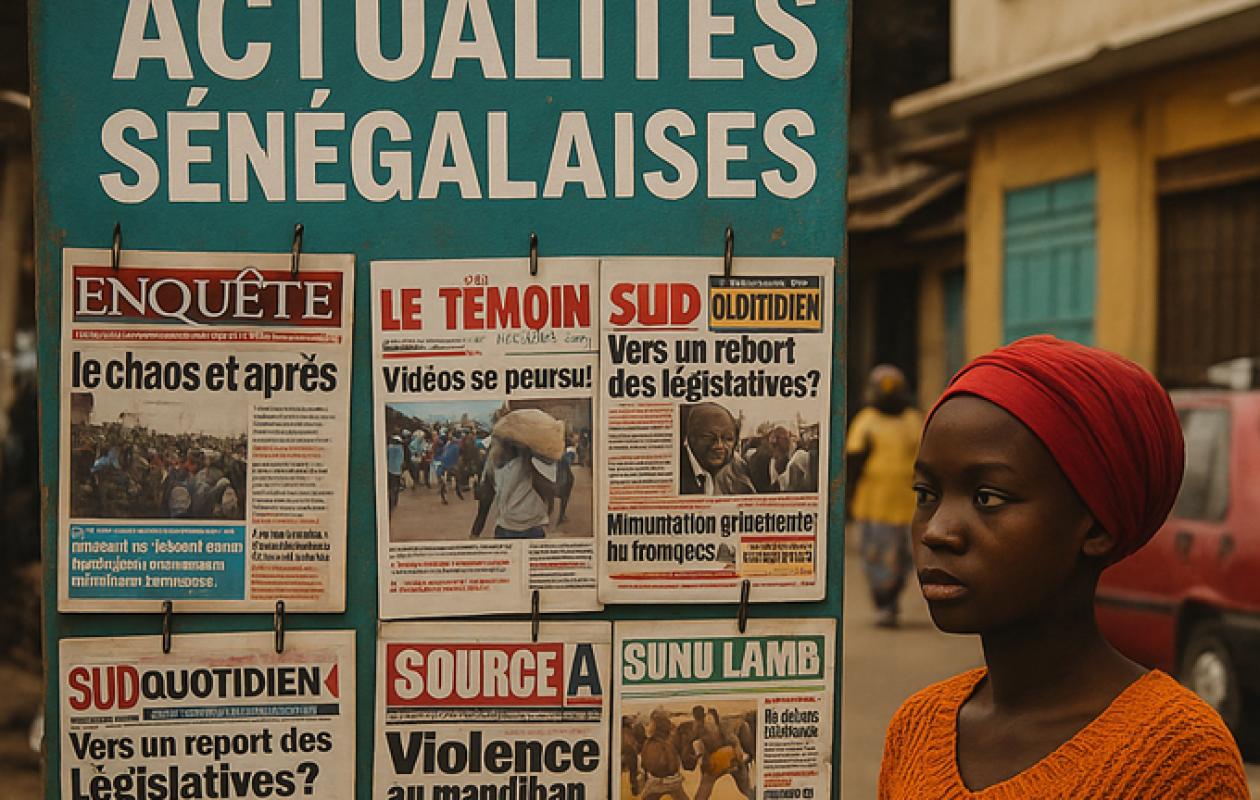
Actualités Sénégalaises et Luttes Populaires
In Senegal, following the news is never a neutral exercise. Television channels and newspapers often belong to economic or political groups that protect their own interests. The result? Social conflicts, strikes, and popular anger are minimized. We talk about "disorder" or "disruptions," but rarely about the real causes. Yet, it is precisely here, in these struggles, that part of contemporary history is being written.
The country remains overwhelmingly young: more than half of Senegalese are under 25. Yet media representations only reveal this youth through fragmented scenes: cheering crowds, confrontations with the police, spectacular but isolated figures. Everything else disappears: the patient work of community organizing, cooperative experiences, the solidarity built on a daily basis. As if youth could only exist as pure social energy, deprived of its political scope. This partial erasure is not accidental: it is a strategy of neutralization.
Teachers, health workers, fishermen: all professions engaged in persistent struggles. They demand decent wages, suitable equipment, and humane working conditions. Yet, when they burst into the media, it is almost always through a negative narrative: the inconvenience inflicted on users, the interruption of services, the “disruption.” As if the demands themselves lost all meaning. This focus is not neutral: it reduces social conflicts to mere blockages, erasing the demand for justice on which they are founded.
Social media presents itself as cracks in the dominant media edifice, opening up unprecedented opportunities for an entire generation to speak out: improvised live broadcasts, viral hashtags, local campaigns capable of crossing borders. Yet this supposed freedom is deployed conditionally. For behind each seductive interface lies an architecture of global power: multinationals setting the rules of the game, accumulating intimate data, and modulating visibility through opaque algorithms. The tool of emancipation, celebrated as a democratic space, can metamorphose at any moment into a disciplinary mechanism, where expression becomes traceable, controllable, and reversible into surveillance.
Sport, in Senegal as elsewhere, is invested with a social centrality that goes far beyond entertainment. Football or traditional wrestling embody forms of collective cohesion, popular rites. But this symbolic and cultural dimension is constantly undermined by market logic. Television rights, transnational sponsors, betting platforms—such as 22Bet —convert fervor into capital. From then on, the field ceases to be a shared playing space: it becomes an infrastructure of financial valorization, where bodies, passions, and even victories are integrated into a mechanism of extraction intended for the powerful.
Every year, the diaspora sends billions. Transfers that save entire families. Yet, in the news, this diaspora is reduced to financial flows. Its political voices, its criticisms, its proposals are ignored. As if money mattered, but words didn't. Yet these millions of Senegalese living elsewhere carry a precious experience: that of exile, but also that of resistance.
Looking at the newspaper, reading an article, is already entering into a power struggle. Because what is said, what is kept quiet, what is exaggerated or erased, all of this obeys interests. Current events are not neutral. They are a permanent construction where the elites seek to impose their narrative and where the working classes try to make themselves heard.
Senegalese news cannot be understood without evoking the weight of colonial and neocolonial history. Media silences are not only editorial choices: they are also the legacy of a framework constructed to protect local elites and foreign interests. Thus, dominant narratives tend to reduce popular mobilizations to moments of instability, when in reality they constitute continuities of struggle. This discrepancy requires a critical reading: what does it mean to recount the present if we systematically erase the past that makes it intelligible?
Digital technology, by disrupting the flow of information, is reshaping power relations. But it's not enough to celebrate the apparent "democratization" of voices. Behind every click lies an algorithm that prioritizes certain content, makes others invisible, and fragments communities into isolated bubbles. This algorithmic filtering creates a news landscape with variable geometry, where the hierarchy of information is no longer imposed solely by editorial offices, but by opaque calculations serving global platforms.
It is striking to observe that so-called "important" news almost always concerns markets, investor projects, and government announcements. On the other hand, the daily struggles of neighborhoods, farmers, women, and youth are pushed to the margins. This sorting is not accidental: it expresses the logic of current events shaped for the ruling classes. In this sense, each television news program, each newspaper front page, becomes a distorting mirror that reflects society in an image deprived of its popular forces.
Senegalese news must not remain a showcase controlled by a few. It must become a space for struggle, a tool at the service of the dominated. Every shared video, every mobilization, every alternative newspaper proves that it is possible to tell stories differently. The question is simple: who writes history? As long as the powerful hold the pen, the people will remain spectators. But when they speak out, news will cease to be a spectacle and become a weapon.
Commentaires (0)
Participer à la Discussion
Règles de la communauté :
💡 Astuce : Utilisez des emojis depuis votre téléphone ou le module emoji ci-dessous. Cliquez sur GIF pour ajouter un GIF animé. Collez un lien X/Twitter, TikTok ou Instagram pour l'afficher automatiquement.